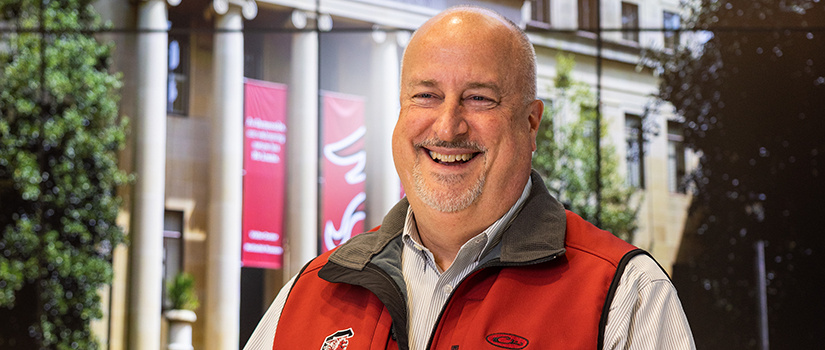Jack Claypoole likes to finish things — and there’s always something else that needs finishing. Right now, that means shepherding projects as executive director for strategic initiatives for his alma mater. Thanks to his decades of experience, and his passion for building things, he walked into the position well-prepared.
The 1987 SJMC graduate split classes between public relations and business administration and found himself with complementary skill sets that differentiated him from his competition in the marketplace. “I was able to sell myself, if you will, to potential employers, and I’ve been doing it ever since,” says Claypoole.
He “sold his way” into banking, into consulting and into teaching at the university. Eventually, he also sold his way into public policy, where he spent 13 years focused on alcohol and drug abuse issues in South Carolina. The connections he made at USC have helped him at every step.
“The incredible part about my career is that every time I’ve been hired, I’ve been hired by a Gamecock,” says Claypoole. This includes a stop at the White House, where he served as the administrator for Drug Free Communities in the Office of National Drug Control Policy under former President George W. Bush.
Once again, he was building — but this time, it was policies for an entire nation. He was organizing domestic and overseas initiatives, all while simultaneously earning a master’s degree in leadership at Georgetown University.
After working alongside both Republican and Democratic governors in South Carolina on issues relating to drug-free communities, Claypoole was asked to help with the transition from President Bush to President Barack Obama. As associate deputy director and administrator of drug-free communities, he helped shape policy for the Obama administration for more than three years.
“It was neat because, by the time I had made the decision to leave, I had finished everything I had committed to do when I first got up there,” he says.
But with his work in Washington, D.C., complete, Claypoole found himself yearning to sport his Gamecock cap once again.
“Public policy is never really going to be a good way to change people’s behavior because you’re trying to solve the problem after its begun,” he says. “I figured the only place that I hadn’t been that might have the right levers to teach people to think was higher education.”
He reached out to three fellow Gamecocks.
“All three of them played a major role in helping me get back to the university, and all three of them were J-school graduates,” says Claypoole.
Initially, he came back as executive director of the USC Alumni Association in 2012. His top priorities? Finding the association a permanent home and engaging better with alumni.
With his help, the university was able to retool its business model for alumni and design the association’s permanent home in Columbia’s thriving Vista arts and entertainment district.
“That, to me, was a lot of fun,” says Claypoole. “But once it was all designed and built and the new strategic plan was done, now there I am again — ‘this isn’t very fun.’ That’s when I went into administration.”
As the university’s executive director for strategic initiatives, Claypoole gets to help guide strategy for where the university is going. Over the last few years, he has helped implement USC’s first strategic plan to deal simultaneously with administration and academics.
Claypoole also helped manage USC’s COVID-19 response for over two years and worked closely with the university’s government affairs team to get Campus Village, the largest student housing development project in university history, off the ground.
All of these projects speak to his skill set. When opportunities around the university need troubleshooting, Claypoole knows how to bring together multidisciplinary teams capable of looking beyond the immediate.
“The upside of being an alumnus at the alumni association was that I formed a really great connectivity across the campus environment and good visibility of who to pull together in teams,” he says. “Our strongest play at the university is the strength of our bench — it’s our people.”
As a professional “finisher,” Claypoole also recognizes the strength of messaging success.
“How we communicate and how people understand the world around them through communication is different than it’s ever been before,” he says. “And I think we, as Gamecocks, have an amazing opportunity to do that.”
